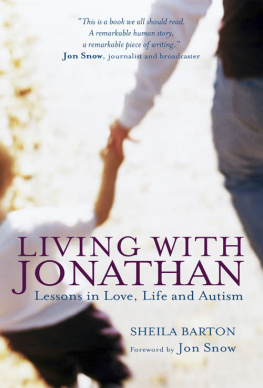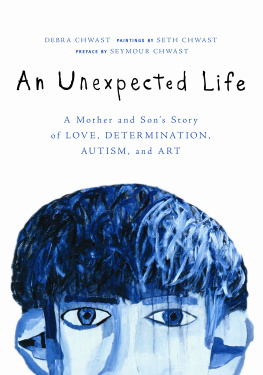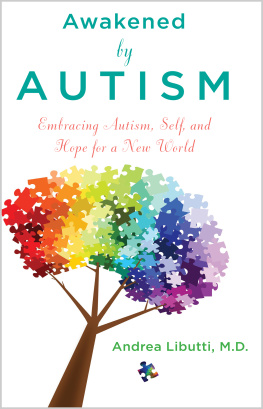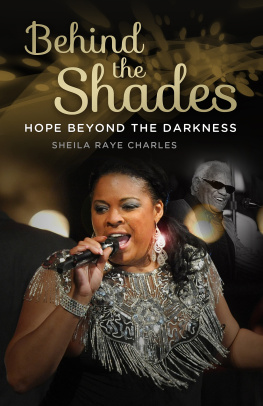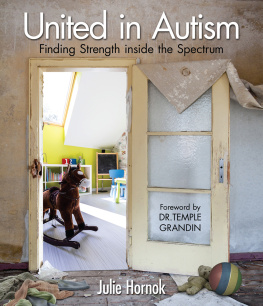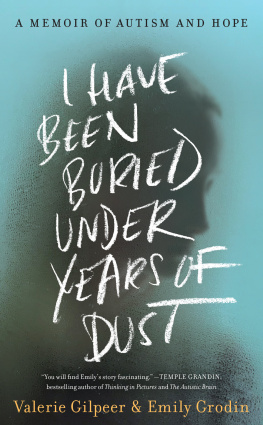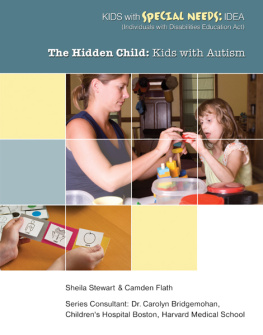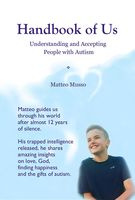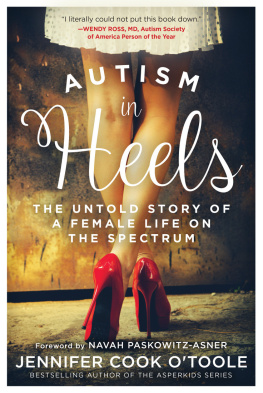Compelling, moving, honest, Living with Jonathan tells a mothers story of bringing up a son with autism. Communicating the parental experience with style, passion and intelligence, its narrative of transcendence moves from the quest to beat autism to a state of acceptance of autism and the autistic person and their contribution to both family and the wider society.
Dr Michael Fitzpatrick, author of Defeating Autism: A Damaging Delusion
Sheila Bartons vivid and lively writing draws a picture of the ups and downs of family life with a child with autism. The overwhelming love she feels for her children and her spirited responses to setbacks are a joy.
Clare Coombe-Tennant, trustee of Ambitious about Autism
We all wonder how we would cope if our child were disabled, looking on in admiration as others do, seeing only a tiny part of the story. Sheila Barton tells it all, with honesty, humour and self-knowledge, making this an outstanding and ultimately uplifting memoir. Autism is a word many of us use often but understand little. Living with Jonathan offers much-needed enlightenment.
Peter Stanford, broadcaster and writer
Parents whose children have just received a diagnosis of autism experience a whole range of emotions and often come to terms with them by hearing about other parents who have shared the same experience. Sheila Bartons book gives an insight into life with an autistic son importantly it highlights the joy that her son has brought to her life. It makes an important contribution to our understanding of living with autism.
Mark Lever, CEO National Autistic Society
A moving, enthralling, personal account of life with an autistic son. Sheila Barton is unflinching in her portrayal of the power autism exerts the beauty and the terror, the joy and the pain. Highly recommended.
Charlotte Moore, author of George and Sam
Sheila Barton took a first-class degree in theology at Cambridge and then worked as a teacher, lecturer, social worker and manager in the charity sector. She has published articles about autism and disability equality in The Observer, The Guardian, The Times, Nursery World and Disability Now.
Living With Jonathan is her first book.
LIVING WITH
JONATHAN
Lessons in Love, Life and Autism
SHEILA BARTON

To my son Jonathan, in admiration and with love. And to Will who made me finish it.
Acknowledgements
I wish to express my thanks to Graham Maw Christie and to Mike Fitzpatrick for believing in my book, and to Shelagh Boyd for all her helpful suggestions. My gratitude goes to all the people in this book who were kind to Jonathan and to me and who treated him with dignity and respect.
My heartfelt thanks go to my husband Will for his constant encouragement, to Cornelius for being a friend to Jonny, and to our granddaughter Caroline for giving me love when I most needed it.
Most of all, my thanks go to Jonathan, who lived it and came through.
All names have been changed except for mine, Wills and Jonathans.
CONTENTS
FOREWORD
by Jon Snow
T HIS IS A SEARINGLY honest and open account of living with a difficult child and is a compelling read. For whilst Jonny is diagnosed with autism, and his world is especially removed from ours, there are few families on earth where a parent does not, at least from time to time, suffer the frustration of living with a child who seems somehow other. Indeed the closer you get to know other peoples families, and your own, the more aware of this you become.
But Jonny is autistic and profoundly so. What is so very remarkable about this lyrical account of living with Jonathan, is the degree to which Sheila, in particular, and her family is general, come to penetrate the weird and occasionally wonderful world that Jonny and his autistic self inhabit.
The utter, exhausting, all-consuming energy that pours through Jonnys autism threads through this book like a torrential stream strewn with rapids. He never stops. Neither does Sheila, craning across her husbands dormant form to reach the coffee maker to fuel herself up at dawn to cope with Jonnys wet bed, and woeful, demanding wakefulness. She pauses briefly to go to the loo, summoning one of Jonnys siblings to keep him going with yet one more nursery rhyme.
Sheilas reward is the sheer normality of her two other children and their capacity somehow to live their lives around Jonnys constant disruption. They are exceptionally understanding children. Far from being disturbed by Jonnys howling, fixations, demands and more, they are in some way enhanced and rounded out by it.
This is a book we all should read. For whilst it may not necessarily expand our understanding of ourselves, it will vastly increase our understanding of a human condition which is expanding exponentially before our very eyes. Perhaps too we shall realise that so many more people in our lives people we work with, live with, intersect with are on some continuum of the very acute condition from which Jonny suffers.
As Jonathans story unfolds, and the complex interactions with him coagulate, I find myself marvelling that Sheila Jonnys mother and our very present informer has not gone completely mad.
Pussys in the well she intones. It is the umpteenth quickly delivered nursery rhyme in a few minutes. And whilst the couplets spew, Johnny somehow relaxes. Any break in the flow, and the demons of his world begin to rebel. The screeches return, the damp patches appear in his trousers, and the whole ritual of hosing down, both verbal and actual, begins all over again.
I have no doubt that writing this book has been for Sheila a cathartic experience. It is also one to read it. A remarkable human story, a remarkable piece of writing.
Jon Snow
October 2011
INTRODUCTION
W HEN MY SON was diagnosed with autism, I refused to believe it. I knew about autistic children they were cold and unaffectionate, unable to relate to other people. Their problems were often caused by pushy mothers, obsessed with their childrens success. As babies, they were indifferent to stimuli and difficult to feed; as toddlers they didnt learn to speak or to play pretend games. This couldnt possibly be my son. This was a child who had barely let go of me since birth, a voracious breast-feeder who had chuckled his way through his babyhood and who sat placidly every day looking at books or pushing play people round on their roundabout. This was a boy who smiled continually; who spoke precociously early and who knew all his colours at 18 months; who sang songs and recited nursery rhymes.
Well he had done all those things. Now he usually sat staring at his books, which were opened at particular pages featuring food. And the speech had largely gone too. Now it was repetitive and functional, interspersed with strange, inappropriate phrases copied wholesale from someone else echolalia I learned later was its proper name. Then there were all the things he had never done. He had never asked a question or thrown a tantrum. He was slow to crawl and slower to walk not because he couldnt but because he just didnt want anything that much. It was an overwhelming desire to get hold of the cat that had got his older brother moving. What Jonathan was short of in his early life was curiosity and desire.
Jonnys journey into autism was a relatively unusual one. Most autistic children dont develop speech at the appropriate age. They are often difficult, unsettled babies who struggle with feeding. The timing of our diagnosis was pretty standard though, at three years old, following expressions of concern from a health visitor. Most peoples diagnosis results from the failure of their child to acquire speech. Ours came after the loss of it, coupled with increasingly difficult and obsessive behaviour. I was right about one thing, though. My son wasnt cold or unaffectionate, and I wasnt a pushy mother. We had, and have always had, a strong and loving relationship. Nowadays, people are less likely to hear this nonsense about cold mothers and children who cant love when they get the devastating news that their child is autistic. But they still hear an awful lot of drivel.

